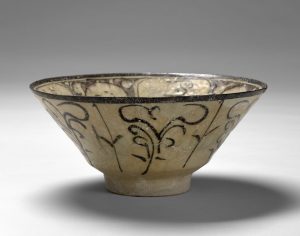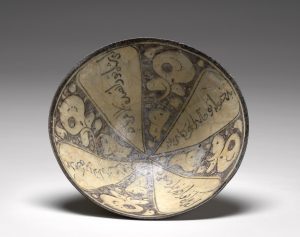Eastern Iran, Seljuk Dynasty. 12th to early 13th century CE
Conical bowl segments with vegetal designs alternated with inscriptions
Fritware, painted and carved slip under a transparent glaze
Gift of Elinor Lander Horwitz, class of 1950
SC 2016:29-26
This bowl is made of frit (ground glass added to clay), featuring a rubaʿi (four-lined poem) in Persian that venerates the Shahanshah (King of Kings). The decipherable text reads:
Oh King, may you have God’s victory
May you say the leaf of truth from the heart […] bravery […]
Whoever may not love you may […]
May your malevolent become […]
Such adulations of the Shah were common in Persian culture and featured strongly across the arts. They stand in sharp contrast to inscriptions from the Qur’an, adages, or blessings of good health commonly found inscribed on Islamic ceramic ware.
The accompanying design of round, dome-like leaves visually reinforce the bowl’s message of “[leaves] of truth,” forming a cohesive blend between text and image.
Mingxuan K. Chia, Smith College ’17
[Detailed Image Description: A ceramic stoneware bowl with designs and text painted in brown and finished with a transparent glaze. The text is inscribed against a plain background that alternates with a vegetal design of bulbous leaves against a brown background, with four segments radiating from the center of the bowl.]

